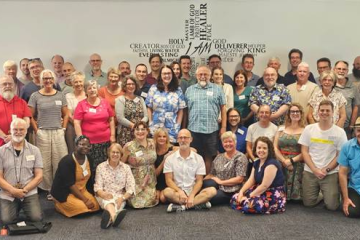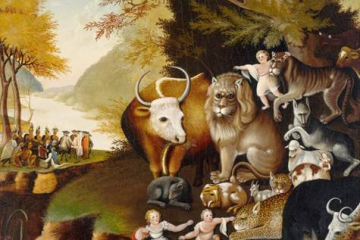Paying attention to the little things – 1 Kings 4:29-34
For the last three weeks, we have been looking at the wisdom literature of the Old Testament – not literature that makes you book smart, but literature that makes you life smart – that helps you use what you know, what you’ve learnt, to live well! We’ve looked at three books attributed to King Solomon of Israel; Proverbs, Ecclesiastes and the Song of Songs; and in our reading today we have a little summary statement about Solomon’s wisdom – that tells us…
Firstly, that he was the wisest of the wise; wiser than the people of the east (which – if you know your Christmas story – is where wise men come from), wiser than all the wisdom of Egypt, and wiser than the four most famous wise men of Israel. In other words, Solomon was the GOAT (the greatest of all time) when it came to wisdom.
It seems odd (contrawise?) to establish a wisdom leaderboard – but it is rather wonderful to think of a culture that honoured wisdom competitions not beauty competitions, speaking good sense not nonsense, being on the wise list not the rich list!
Secondly, we’re told Solomon’s output was prolific! That he composed 3,000 proverbs and 1005 songs! To compare this to Shakespeare (as we like to do!) Shakespeare is credited with 100 or so sayings and 375 poems and 37 plays. So, Solomon wins. But a lot of the proverbs in Proverbs are not Solomon’s and only 18 psalms are said to be his, so perhaps Shakespeare is the winner – but who’s counting! It’s the wisdom that counts!
Because, thirdly, what this summary tells us is that Solomon was not just the greatest of all time, but that he was interested in everything – from the huge cedars of Lebanon to the tiny hyssop growing in the cracks in the walls. In other words, wisdom, for Solomon, was about paying attention to the big things (we can’t miss the big things) AND paying attention to the little things (we often miss the little things).
I was reminded of this three weeks ago listening to Claire Harvey, co-author with eco-theologian and meteorologist Dr Mick Pope of A Climate of Hope: Church & Mission in a Warming World, speak about her lifelong commitment to climate action.
But more recently, Claire said, her care for creation had brought her down to the very very small things. And she showed us this slide. “These are mostly pictures from my garden,” she said, “Tomatoes, raspberries, cucumbers and potatoes. A spider’s web, a beautiful unfurling leaf from the plant that’s behind me, actually. I could look at that, for hours just marvelling at newness of life. And then a tree from a local park where council was going to put a kindergarten and there was a massive fight. And the tree has a sign on it saying, ‘save me’.”
Claire said – that more and more – she was, “leaning into desiring spiritual revival and renewal.” But not the kind she used to believe in – saving people’s souls so they would go to heaven. Now, she says, “I think [we] need to change in even deeper ways for the sake of the planet…. I want people to have a deep transforming experience of …the importance of reconnection, not just with God, but with… all our neighbours… [with] all of creation.”
Something very similar was said by another person on the wisdom leaderboard, Julian of Norwich, an anchoress (or kind of hermit) who lived from around 1343 to 1416 and is now recognised as one of England’s greatest mystics (also the patron saint of cats!) The Long Text version of her Revelations of Divine Love is the earliest surviving English-language work by a woman and consists of 86 chapters and about 63,500 words.
Of one of her experiences of God in prayer, she writes:
I saw that God was everything that is good and encouraging.
God is our clothing that wraps, clasps and encloses us so as never to leave us.
God showed me in my palm a little thing round as a ball about the size of a hazelnut.
I looked at it with the eye of my understanding and asked myself: “What is this thing?” And I was answered, “It is everything that is created.”
I wondered how it could survive since it seemed so little it could suddenly disintegrate into nothing
The answer came, “It endures and ever will endure, because God loves it.”
And so everything has being because of God’s love.
Can I give you some homework for next week? Can I invite you to go through this week paying attention – as Solomon did – to the little things? Can I urge you – as Claire does – to desire a spiritual revival and renewal that will connect you to God and others and all creation? Can I remind you – as Julian was reminded – that everything has being because God loves it – that everything has being because of God’s love.
And as you go through this week perhaps you can take a picture and email it to me – of something – something very small – that this week reminded you of God.
To give you an idea – here’s one I took this week – and my email address is there on the screen.
Let’s sing this well-known hymn – with some more Australian verses added – All things bright and beautiful!
Call to Worship
Bless your Creator, all animals of the land.
Praise and exalt our Creator forever.
Bless your Creator, all birds of the air.
Praise and exalt our Creator forever.
Bless your Creator, all creatures of the sea.
Praise and exalt our Creator forever.
Bless your Creator, all children of God.
With all of creation, we praise your name.
Introduction to Blessing of the Animals
The last verse of that hymn sums up what we are doing here today. From Psalm 150, verse 6, “Let everything that breathes praise the Lord!”
Today we are blessing the animals because we believe that every creature can praise God – because every creature matters to God.
To give you an idea of proceedings, after the next hymn, there will be a Bible and a short message and prayer and then we will be blessing the animals and the humans they have brought with them!
Churches around the world do this near the Feast Day of St Francis of Assisi, the patron saint of animals and the environment, which is the 4th October this week.
In biographies of St Francis, they once he once preached to a flock of birds, reminding them that God had created them and cared for them, and the birds responded with joy, gazing at St Francis attentively. (Hoping I’ll be equally as engaging!) “From that day on, [it is said St Francis] carefully exhorted all birds, all animals, all reptiles, and also insensible creatures, to praise and love the creator…” (see I Celano XXI).
Right now – as we look around our world – at what is happening – we need the reminder that every creature can praise God – every human – every thing. That every creature matters to God.
One of our younger church members asked me last week if we could sing this song for peace – so as Elizabeth requested – let’s sing the song of peace together.
Prayer of Thanksgiving and Intercession
Leader Let us give thanks to God for the gifts so freely bestowed upon us…. for the beauty and wonder of your creation, in earth and sky and sea;
All We thank you, Lord.
Leader For the richness of the mountains, plains and rivers;
All We thank you, Lord.
Leader For all that is gracious in the lives of men and women;
All We thank you, Lord.
Leader For all creatures that breathe, and move, and have life;
All We thank you, Lord.
Leader For the songs of birds and the loveliness of flowers and trees;
All We thank you, Lord.
Leader For the trust you have shown in giving into our care these, our pets;
All We thank you, Lord.
Leader That each pet here may be treasured with care;
All We pray to you, Lord.
Leader That we may love and honour all your works, O God;
All We pray to you, Lord.
That we may continue to grow in our grateful enjoyment of your abundant creation;
To the honour and glory of your name, now and forever, we pray to you, Lord.
Maddie’s Prayer – Prayer ‘for this world’ by Walter Rauschenbusch
Enlarge within us the sense of fellowship
with all living things,
our brothers and sisters the animals to whom you gave this earth
as their home in common with us.
We remember with shame that in the past
we have exercised the high dominion of humans
with ruthless cruelty,
so that the voice of the earth,
which should have gone up to you in song,
has been a groan of travail.
May we realize that they live, not for us alone,
but for themselves and for you,
and that they love the sweetness of life even as we,
and serve you in their place better than we in ours.
We pray through our Savior Jesus Christ,
who lifts up and redeems us all. Amen.
Offering Prayer
We give you thanks, most gracious God, for the beauty of earth and sky and sea;
for the richness of mountains, plains, and rivers;
for the songs of birds and the companionship of animals.
We praise you for these good gifts,
and pray that we may safeguard them for those who come after us.
Grant that the gifts we bring and the lives we live may honour you and your creation,
now and for ever. Amen.


